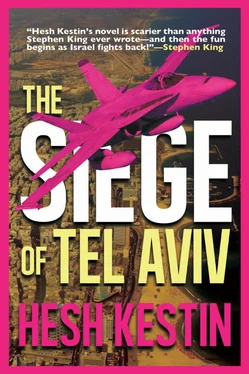“Sire, he hears certainly. But something is wrong in his brain. He hears, but understands little, like a child. By Allah, I have taken him under my protection.”
The lieutenant now stands before Abed. “Have you money, filth?”
“No, lordship. Only dates.”
“How then do you live?”
“Upon dates, sire.”
“Tell me, then, camel shit. What should I do if my men open your bags and among the dates is found money, or gold, or weaponry?”
“You should kill me, excellency. My lord, you should kill us both.” The Syrian lieutenant spits. “Go. When you sell your dates, return by this route and pay a toll in gratitude that I have spared your miserable lives.”
Abed falls to the ground and kisses the lieutenant’s boots. “So we shall, nobility. Thank you. Thank you eternally in the name of Allah. In the name of the prophet may your—”
The lieutenant kicks him away. It is not a symbolic kick.
In a moment, the two Bedouin lead their donkeys onward, mounting only when they turn out of sight.
“Abed, how could you debase yourself like that?”
“How would you have wished me to debase myself?”
“There were only six. We could have reached into our packs and killed them all.”
“And the sharpshooters above would have cut us down on the spot.”
“What sharpshooters?”
“The ones you did not see, Cobi. The ones you are not supposed to see. For a month I have been watching such bastards as these, all the same, trained alike. They never operate without cover.” He raises his index finger. “Pay attention: brain, not strain, brings gain.”
“Old Bedouin proverb?”
“No,” Abed says. “But it sounds good.”
ABOVE THE SIX SHIPS on a collision course with an Egyptian frigate and two trailing corvettes, a helicopter marked PRESS in Arabic and English hovers like a buzzing witness, a video camera pointed out one window to record what is expected to be a major news event.
On the bridge of the frigate, an Egyptian admiral—the English word is itself derived from the Arabic amir al-bahr , ruler of the sea—lowers his binoculars from the press helicopter to focus on the line of six freighters. His executive officer stands by his side and just sufficiently behind, also with binoculars.
“Firing short, excellency?”
“Firing straight on,” the admiral says.
“Civilian vessels, excellency.”
“My orders are clear. Firing straight on.”
The exec speaks into the squawk box. “Bridge to Fire Control. Closing on target. Establish range.”
The admiral places one hand on the younger man’s shoulder. “Yussef, do this once and done. Then no others will come.”
As he speaks, the ship’s five-inch 54 cal. guns swing slowly around.
ON THE DECK OF CV Star of Bethlehem , the hymn singing reaches a fever pitch as the members of its motley crew stare straight ahead at the approaching Egyptian warships.
From the bridge, Captain Frank depresses a button on the loud hailer that is his only means of communication with the ship—the waa-waa-waa of the amplified device stops the singing in mid-note. “Yo! Below! This is the captain speaking. Will one of you sopranos hoist the flag per instruction, or do I have to go below and do it myself? For fuck’s sake, the Lord seems to be occupied elsewhere. Raise that goddamned flag!”
ON THE BRIDGE OF the Egyptian frigate, a white flag can be seen rising to the top of the communications mast of the first freighter. One by one, the next five ships follow suit.
The executive officer lets hang his binoculars. From this distance, they are no longer necessary. “Begging your pardon, excellency.”
“Don’t even say it, Yussef.”
“But excellency, Law of the Sea—”
“Yussef, who will know?”
The exec points above, where the press helicopter has dropped to hover above the fast-closing Egyptian warships, video camera pointed out its window.
“Take it out,” the admiral orders.
“Excellency, I protest. The helicopter is clearly marked. It is a noncombatant. As are the six vessels. These are civilian vessels flying the white flag of surrender.”
“Yussef,” the admiral says with a mixture of kindness and authority. “Do you wish to spend your naval career scrubbing toilets in a brig in Alexandria harbor?”
The exec switches on the squawk box. “Bridge to fire control. Hold steady on target awaiting command to fire. Repeat, steady on, awaiting command.” He pauses. “Bridge to sea-to-air battery. Sea-to-air, come in.”
An affirmative noise responds.
“Sea-to-air, acquire spinner at two o’clock, range three hundred meters, altitude one hundred meters and holding.”
Another noise, this one longer, and clearly not affirmative.
The executive officer turns to the admiral. “Excellency, sea-to-air battery reports target is clearly marked Press.”
“A Jewish trick,” the admiral replies.
“Excellency?”
“Shoot it down. Then order gunners to take out all marine targets dead ahead starting with…” He raises his binoculars. “Star of something.”
“Star of Bethlehem , excellency.”
“Indeed, the star. What did I tell you, a Jewish trick.”
“Excellency?”
“Yussef, Yussef. Tell me, what is the symbol emblazoned on the Jewish flag?”
“With all respect, excellency. The ships fly the white flag.”
“Never mind. The Jewish flag, what is its well-known emblem? The cross? The crescent?”
The exec sees where this is going, but can do nothing other than give the required answer. “The star, excellency.”
“The star is correct, Yussef,” the admiral says. “The Jews’ star. Now do your job without further delay. We are in battle.”
FROM THE EAST, THREE pink F/A-18 Super Hornets cross from the Sinai Desert and are now over open water heading due west at almost twice the speed of sound. In the lead aircraft, Jimbo opens communications, until now suppressed lest their electronic signatures be picked up by US signal-monitoring satellites overhead. “In four to engage. Reducing to attack speed. How you ladies doin’? Over.”
Stan: “Reducing speed. Guys, not too late to turn back. My war. Over.”
Chris: “Shut your pie hole. Over.”
Stan: “I’ll never forget this. Over.”
Chris: “Ain’t happened yet. Over.”
Jimbo: “Happenin’ in two. Ourah! Over.”
Stan: “Roger that. Ourah! Over.”
Jimbo: “We have tally. Repeat, we have visual at nine o’clock. Careful of them cargo tubs, ladies. Ourah and shaalome!”
ON THE DECK OF CV Star of Bethlehem , the singing continues with a kind of resolute hopefulness, less fervent than earlier but with a good deal more affirmation. If something very bad is about to happen—and there is every indication it will—the mostly Christian crew clearly wishes to die pronouncing words of faith, not fear. They have just broken into “Rocka Ma Soul in the Bosom of Abraham” when Connie Blunt, her producer, and her cameraman scramble up the ladder leading to the bridge and burst in.
“We’re flying the white flag. Don’t they see it?”
Captain Frank is circumcising a large cigar with a small, very sharp knife. He does not look up from his work except to gaze out at the approaching fleet. “At this range, they sure do.”
“Well, what’s going to happen?”
“Like I said, sister, there’s no telling. I’ve been Morsing we’re unarmed, but they don’t reply.”
Читать дальше












